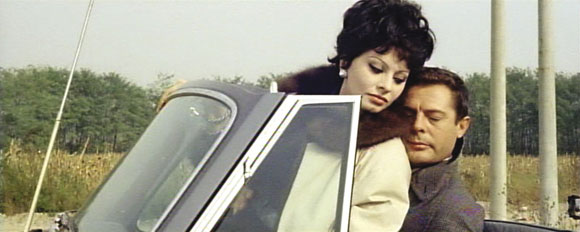Sophia, Marcello, and Vittorio

Sophia Loren in YESTERDAY, TODAY AND TOMORROW

 This week we begin in Italy with the Sophia Loren Award Collection:
This week we begin in Italy with the Sophia Loren Award Collection:
Yesterday, Today, and Tomorrow, Marriage Italian Style, Sunflower
Kino Lorber has assembled three of the best, and most popular, films from international superstar Sophia Loren. The four disc set also includes a 90 minute documentary on Vittorio De Sica, the Italian director of these three films, as well as such neo-realist classics as Umberto D., Bicycle Thief, and Shoeshine (below). All three films also co-star Marcello Mastroianni. In the constantly humorous Yesterday, Today, Tomorrow (118 minutes, 1963), Loren plays a street vendor who runs afoul of the local police. She learns she cannot go to jail while pregnant, so her husband (Mastroianni) keeps her constantly pregnant to avoid imprisonment. In Marriage (101 minutes, 1964), Loren plays a prostitute who becomes mistress to a philandering businessman (Mastroianni) whom she tricks into marrying her. In the sad Sunflower (107 minutes, 1970), Sophia and Marcello have a whirlwind romance during World War Two. He leaves for the Russian front, goes missing, and then she decides to go find him a decade later.
Shoeshine (****)
In this restored and digitally remastered 1946 neo-realist classic, which won an honorary Oscar before the creation of the Best Foreign Language Film category, De Sica took his cameras to Rome’s devastated post-war streets. He used non-professional actors to tell his heart-breaking story of two shoeshine boys snared by the police for trafficking in stolen goods. Sent to a brutal juvenile prison, they and their loyalties are tested when one is suspected of being an informer. De Sica depicts the sorry post-war conditions in his beloved city, showing the potential harm to future generations.
Not rated, 91 minutes. The DVD contains commentary with author Bert Cardullo.
The Prizefighter and the Lady (***) Third Finger Left Hand (***1/2), The Great Divide (**)
The on-demand Warner Archives again concentrates on an individual career—this time, Myrna Loy. Among the many new Loy titles now available, we caught three of them, all unrated, for this week:
The Prizefighter (102 minutes, 1933) brims with trivia, both movies and sports. Loy plays Belle, a gangster’s moll who falls for promising prizefighter Steve Morgan, played by future real-life Heavyweight Champion Max Baer. They marry despite threats from the gangster (Otto Kruger) and warnings from the boxing manager (Walter Huston). Morgan faces off against actual champion Primo Carnera, whom Baer would face, and defeat, less than a year later for the title. Former champion Jack Dempsey referees, and former champs Jess Willard and Jim Jeffries make cameos. Although neither is credited, Howard Hawks and W.S. Van Dyke, who would later direct Loy in The Thin Man movies, co-directed. By 1940’s Third Finger (96 minutes), Loy had gained royalty status and could carry a movie on her own. Here, she’s romantically paired with reliable Melvyn Douglas. She plays a successful magazine editor who pretends to be married in order to avoid men’s constant advances. In a clever contrivance, Douglas enters her life and then masquerades as her husband, which, of course, she cannot deny. Of course, those knuckle-headed kids fall for each other. Smart script by Lionel Houser offers biting dialogue along with its stretched plot. Look for esteemed character actor and future Hollywood acting coach Jeff Corey in an unbilled appearance as a Swedish tourist at Niagra Falls. Twenty-nine years later in 1969’s True Grit, he would deliver, as Tom Chaney, the immortal line to Rooster Cogburn (John Wayne): “I call that bold talk for a one-eyed fat man.”
The Great Divide (72 minutes, 1929) is a deservedly forgotten relic in which a supporting Loy plays Manuella, a Mexican woman torn to jealousy when her beloved (Ian Keith) falls instead for the boss’ daughter (Dorothy Mackaill). Set in a southwest town bordering on Mexico, the film shows the narrative, sound, and visual limits of early talking films.
Daydream Nation (***1/2)
Of the many films this week focusing on relationships, this older-man-younger-woman comedy-drama offers a little extra. A sultry Kat Dennings (seen in the current “Thor”) plays Caroline, relocated to a small town with her widowed father. She also delivers the bland narration which covers most of this over-plotted curiosity: two simultaneous romances, the parents also having a romance, a serial killer on the loose, and a toxic fire burning near the town. Director Mike Goldbach somehow juggles, mostly successfully, all these elements from his own script.
Rated R, 98 minutes. The DVD, in all formats, includes a seven minute “behind-the-scenes” featurette.
The Other Woman (**1/2)
Natalie Portman stars as Emilia, the title femme fatale, a lawyer who begins an affair with her married boss (Scott Cohen). He divorces his strident wife (Lisa Kudrow), who also makes sure Emilia has trouble bonding with her young son William (Charlie Tahan). The drama rings painfully true, but in the end, few of these people are likable.
Rated R, 102 minutes. The DVD comes in all formats.
Red, White and Blue (*1/2)
Filmed in Austin, this grimy drama focuses on Erica (Amanda Fuller), who tours bars and sleeps with as many men as possible. And she also transmits a deadly disease. Finally, one of her targets receives the bad news and seeks revenge. Meanwhile, a mysterious stranger (Jonah Taylor) becomes her protector. Empty, pointless film.
Not rated, 104 minutes. The DVD also offers a 17 minute “making of” featurette, three minutes of bloopers, and four minutes or so of deleted scenes.
Poor Pretty Eddie (*)
So bad it’s entertaining, this 1975 schlock has an impressive name cast but stars Michael Christian as Eddie, who lives in rural Georgia with his slightly older and heftier love Bertha (Shelly Winters). A famous African-American singer (Leslie Uggams) has car trouble and ends up in Eddie’s lodge. There, she’s raped but finds no help from the town’s local racists, including the sheriff (Slim Pickens) and justice of the peace (Dub Taylor). The crass and offensive, but never boring, film has survived under several names.
Not rated, 86 minutes. Available in all formats. The DVD includes a fascinating history of the film, originally financed by pornographers (Shelly Winters was paid by having suitcases of cash delivered on set).
Also this week: The Mechanic, Monogamy, The Rite, The Roommate.